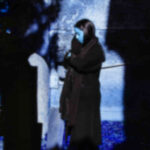Twelve Thirty Eight
Reading Time: 19 minutes
"It is all about paragraph five. Oh, and with just a soupçon of fiction thrown in for good measure." - Allen Ansell For a whole week there had been grey clouds, miserable rain, cold winds, and damp air. Each morning at the house on the hill, the younger man had risen early to light the wood stove, sometimes collecting kindling and firewood from the stack at the back of the house while still in his pyjamas. When the others appeared, the house would be warmed, and their breakfasts would be taken in comfort. How strange therefore, that on this particular day the change was so spectacular. So instant. The morning air was warm, the sky was magnificently blue, and there was a definite sense of optimistic expectation in the air. At any moment of time, a myriad events have come and gone. At twelve-thirty-eight that day, the reality of various personal expectations would fully materialise. I wonder what it must be like to be the engineer of that moment… the creator of it? -----o----- In the brilliant sunshine, the family at the house on the hill were eating an early lunch, seated around a table in their front garden. The younger man had poured the wine, some of it had dribbled down the side of his glass. The green garden furniture had become hot in the sun, and the circular ring of wine left from his upraised glass dried visibly; transformed itself from liquid to invisible gas right in front of their eyes. But none of them saw it happen. The food was good. Plentiful. Fresh. As it always is in this countryside. Coming from the local farms. Cooked by the younger woman, whose mastery of the kitchen was legend. They ate slowly, savouring the flavours. Potatoes from soil to plate in less than three hours. Cream from farm to mouth in similar time. Wine of the region, carefully prepared, respectfully stored, aged, and allowed to breath before exploding pleasingly upon the tongue and slipping velvet-like down ecstatic throats. A multitude of sensations from plate and glass. The older man walks into the house and returns with his new camera. Digital. Complicated. Too complicated. He had earlier shown it to the younger man, displayed it’s zoom capabilities, explained that it would take video shots, and then sat reading the instruction manual to find out how it did these things. Now, after lunch, he was ready to practice. The other three posed as people do when they know a photograph is about to be taken: Turning their best profile towards the acquiring lens, smiling their most sincere smiles, apparently ignoring the camera – but holding their stomachs in. The man with the camera studies the image on the tiny camera’s display, and says that he thinks he’ll take another one… ‘just in case’… and dutifully they assume their posed positions once again. The second image also excludes the younger man – all that can be seen of him are his knees. The cameraman turns, and takes a picture of the garden, and then the front of the house. Then he quietly turns back again and quickly presses the button to capture the three of them unprepared. This time the younger man’s thighs also enter the scene. There is the sound of a siren. They all stop, and turn, and look down the drive, waiting to see if… ‘What was that?’ Exclaims the older woman. ‘It sounded just as if a baby cried…’ They all listen. Intently. But it is gone. A small red Sapeur’s vehicle slowly passes by, and two indistinct hazy figures walking: A woman with billowing full skirt holding the hand of a small boy. The cameraman does not record this image, he simply allows the electronic miniaturisation inside his camera to tick up to, and past the moment, and the time-stamp 12:38:00 appears but is forever lost. -----o----- In the darkened hallway of the Dubois family home, a young man lifts himself from out of the chair and paces towards the bedroom door and back again. He is trying to calm himself. Trying to control this body that has the habit of being in control of itself. He sits back down again, and listens. The mumbled sounds from the other side of the heavy wooden door, have ceased. All he can hear now is the slow ticking of the old grandfather clock in the downstairs hall. He breathes deeply: In… Out… In… Out… Just as he has been helping his wife practice in preparation for this day. His mind skips back the nine months to a July that is passed and gone in all but memory. To a dark oak bed set in the cool bedroom. The windows are open but the shutters are partly closed to provide shade. A breeze billows the white net curtains at the front window, and bellows out the ones at the rear. In between it wafts over their entwined bodies, cooling their fire-hot skin, vapourising body fluids on the way, and later, it spreads their gathered molecules, like seeds, among the blaze-red geraniums in the garden. No one saw them fall from the air. No one heard their tumbled landing. No one saw the petals of the flowers swaying from their impact. He remembers the passion. The sudden rumble of lust inducing hormones that flooded his body and sent him into the spiral of desire; where he was spun uncontrollably, sucked magnetically towards the center. And once there, at the very core, where every fibre of his being was sprung like a coil, he remembers being shot through the black hole of procreation and spread in a gush of fluid that was hidden to the breeze. The fluid that imparts his half of the code. A code so complex that in it’s finite detail it is beyond the understanding of mere mortal men. An algorithm containing a secret of time - and of life itself. Her skin… Her soft, smooth, olive skin. The gentle curve of her smooth breasts, slipping seamlessly from her slender neck roundwards and downwards to culminate in the darker puckered skin from where protrude those proud and glorious nipples he had kissed. Her lips… moist with the flavours of other kisses, plump with excitement, rouge with desire, parted, open, inviting… The clock chimes the half-hour and breaks his dream, smashes through the reminiscence. And though, afterwards, his mind flickers back through time to those bedroom moments, it does not stay there. Instead it flicks through the days that followed. The weeks during which her belly had become home to the fruit of their passion… their longed for child. And he remembers the sleepless nights, when in the deep black hours he had sat rubbing her aching back… And last night, when, in the slate grey hour before dawn, in the still pool of ascending day before the birds could exercise their wings and trills, when her rhythmic pain had first begun… And then he was back again… Here… Now… Waiting. His wait ended just as the grandfather clock’s large brass hand had not long started its upward climb; When the new born girl whimpered in Docteur Roget’s strong, but gentle, hands. For Elizabeth Dubois is was a relatively quiet beginning, made not long after the moon had arrived at twenty degrees Leo, in opposition to Mars. Grandmama Dubois looked at her watch, and mentally recorded Elizabeth’s time and date of arrival into her ancient family: April 18, 2005. 12:38 pm. -----o----- Sometimes people wonder at the cruelty of life, forgetting for those moments the heavy sweetness that is contentment, the giddy exaltation of fulfilled desire, and the soft downy mellowness that follows a cordially shared glass of wine… or perhaps, of vodka. It is understandable. Though time is everlasting, it is nevertheless measured in portions, gathered in blocks, experienced one metered moment after another. What has passed before is gone. What is now is the reality. What is to come is complete mystery. For Daniel Viscont, the metered moments have not stacked as high as he desires. And he has high expectations for them reaching almost to the stars. It is nine in the morning, and already Daniel has weeded between three rows in his field. He trudged a little wearily from his farmhouse at seven, and with his hoe leant over his right shoulder he headed for the field that had been planted-out ten days before. Today, he thought, the weeding will not be such a pleasure; Today, everything will seem like a chore. Despite his feeling tired at the start of his working day, he planned to weed the entire twenty rows before sundown. Marguerite met him at the end of the third row, with a bottle of water that she had just brought from the supermarket in their battered grey Citroen. He drank deeply from the bottle, and was surprised by his thirst. Their talk was of the last evening’s meal, and also of his surprising thirst. The meal they had shared with their daughter, husband, and two grandchildren. ‘Perhaps it was the Brandade?’ Suggested Marguerite. Adding, ‘It was a little too salty for my taste.’ ‘Perhaps…’ Ventured Daniel, drinking another mouthful and swilling it around his thankful mouth. ‘Well, I must get on if we are going to finish this lot today…’ He said, whilst raising himself back to his feet from sitting on a pile of logs stacked near the road and walking the few meters to the beginning of the fourth row. Marguerite didn’t kiss him goodbye, nor he his wife. It was their ancient routine; her coming from the farmhouse in the mornings to bring him water, sometimes with a slice of cake or a couple of madeleines fresh from her oven. It was a part of the normal working way on their farm. In the afternoons, after the midday meal, she would join Daniel in the remaining work of the day out in the fields. In the humdrum task of weeding, Daniel has discovered one small secret of time; a key to turn the repetitive task into the actions of an automaton, while inside his mind relives phases of time itself. This morning, for some strange reason (though one that escapes his observation) his mind travels backward to his life as a boy on his parent’s farm at Mayrac. And during the fourth and fifth rows, he has relived a typical childhood morning in immaculate and finite detail. It is as if the pathways of his brain have reached a point where there is a shortcut back to earlier days: Almost to the very beginning. The sixth to eighth rows see a series of other memories flood back; of people and things from years gone by; his grandparents, his children, their christenings, his grandchildren, they all file by through his mind’s eye while he works. They are all happy, fondly remembered moments. It is eleven-forty-six when he stoops rhythmically down to pull another weed from the ginger soil and feels slightly dizzy upon arising. It is not just any weed. It is the final weed - of the morning. It is special. It holds this moment dear within it’s short life, for now it plays a leading role in the scene. It’s importance magnified to those who know the story, to those who can see the act in play. It bleeds its sappy molecules into the calloused dry fingers that grasp its weeping stem. He does not feel their wetness. He does not feel them permeate his skin and join with him inside. He mumbles to himself that it is the heat that makes his head to spin. ‘Time to head for home.’ He says out loud, and begins his marvelous journey. As he rounds the copse of small trees where formally his garden ends and the farm begins, the pendulum in the tower of the Church of St. Nathalene, across the fields, swings low, and he hears it’s bells begin their marker for a morning passed. It is twelve noon, and he is a few minutes later than usual. He stops for a moment, props his hoe against the garden wall, and stretches his back. Hands on hips. Arching backwards and looking up at the clear blue sky. Then closing his eyes, looking for a moment at the brilliant red light that illuminates his retina through his eyelids. The blood of life, he muses. The juice that holds the key to time itself. The moment passes. When he opens his eyes again and glances to the door of the farmhouse, for one tiny moment he sees not his wife standing there waiting, but his grandmother, Elise. He blinks Grandmama Elise away, and blinks back Marguerite. She is a little late with the meal, so after a quick splash of cooling water over his face and hands, he decides to spend a rare few minutes resting in the sun – sitting on the old bench set against the southern stone wall of the house. From there, he can see across the fields and trees and on to the hills beyond. In the distance he sees something sparkle on the tower of the Church, and he squints his eyes to see against the light. It is twelve-forty-one when Marguerite comes to fetch him for his meal. But she is too late. He went with Elise, just three minutes before. When she had held out her hand for him, he had heard the thud in his chest. It was a sudden unexpected sound, like that of a bird that has flown into a pane of glass. Similarly, as a bird would settle to the ground, he settled slowly down upon the bench, shaken, dazed momentarily… but then, just as he had when he was a small boy, he took Elise’s hand, rose up, and walked off with her. There was no-one to see them go. There was no-one present to say goodbye. They spoke no words to one another. All that could have been heard was the twittering of the birds, and the sound of a welcome breeze blowing through the nearby leaves. Elise simply held out her hand, and Daniel took hold of it in complete faith. His metered moments stacked to completion at twelve-thirty-eight precisely. -----o----- Outside her house, in an isolated spot down a long track that twist through the trees, Madame Spit struggles to move the planter. It is heavy. Weighted with the rain of recent days. Too heavy in truth for her aged bones to handle. But she is a proud old lady, and she grits her teeth. Her skinny hands wrap themselves around the earthenware handle. Her fragile wrists appear from beneath the grey woollen sleeves of her sweater, and as she gasps for air she sees the age-spots smudged over their wrinkled skin. Gathering her energy for the next explosive pull, her sadness sheds two tears in sudden recognition of the fact that things are no longer easy for her to do; that her independent life might soon be impossible. The tears are not allowed full reign. She permits them only to leak into her eyes and slightly mist the view. She tightens her throat, and stops them in their tracks. Blinks them away. Takes a deep breath and throws her weight backwards. It is ten-twenty-seven. The moment in time, when all those years ago, in a hot shady Spanish shed, Manuel López Covas first rolled the red clay between his hands. Strong, fine hands, that were stained the colour of his medium. Brown muscular forearms flexing and tensioning the tendons that led to his craftsman’s fingers fashioning the second handle for the pot. From his brow, trickled a fine bleed of sweat, through and around his bushy eyebrows. For a moment he stopped. Looked up. Brought his left arm up to his head and spread out the sweat in a thinner layer between forehead and forearm. Then resuming, twitched his nose… trying to dislodge some sweat that had trickled down the bridge. It stayed there regrouping itself before the final plunge downwards through thin air… splat onto the clay. His fingers kneaded the sweat into the clay, and in the magic of his blending, in the secrets of the clay’s crystalline structure, there was implanted a code. A code of such complexity that it defied mere human understanding. A code that set the strength of the bond between handle and pot. An unalterable pattern of molecules at the boundary between the body of the pot and the new handle, wherein lay the secret of time. From that moment on, from that day forth, well past the final breath of Manuel López Covas, well after it’s long journey up through the distant mountains and into France, it’s crystalline clock ticked. At ten-twenty-seven precisely, the handle and the pot parted company. A bond of fifty one years and exactly seventeen days is broken. With great dignity, with absolute silence, the handle released it’s grip on the parent body, and allowed both itself and Madam Spit to fly. Backwards and into the air, like a swimmer plunging backstroke through the waves she goes, her hands releasing the handle to it’s own trajectory. Her arms accelerating upwards, thrown up over her head in a vain attempt at restoring balance. But they move in wishful thinking. No one can stop this moment. No one can stop the tick of passing time. No one asks why. No one is watching. No one sees her flight. No one sees her fall. No one records the moment with their eyes, and her eyes only record the vision of the bright blue sky above her while she flies light and free through the April air. Her grey skirt billows for a moment in mid air, and the soles of her shoes see the full light of day. Her hair wisps over her face, and the air is in motion… just like her. Madam Spit’s flight is longer than some might imagine, if, in their wildest dreams, they created this moment in the cobwebs of their mind’s eye. For she was at the edge of her terrace, itself more than a meter from the sloping ground below. Time even for her to hear air rush past her ears… before the thud. And time too for her body to rotate through ninety degrees to face across the verdant valley, and see the far off trees… before the darkness came. In the quiet of her garden, the birds flit playfully through the trees, and the leaves on those trees rustle in the fleeting wind. One or two of last year’s, brown, dried, discarded leaves, are blown gently to cartwheel toward her house, and one, with veins as prominent as those on the back of Madam Spit’s hands, stops and lodges itself in the shady place between her body and the soil. She sleeps. She does not see it. she does not feel it. Mercifully. It is ten-thirty-eight. And from a dream of happy youthful days, of a boat ride with her parents in Amsterdam, of the taste of a sweet-filled pancake on her tongue, of a growing sense of discomfort in her hip as it is pressed against the hull of the wooden boat; and with her father saying, “Wij zullen gauw weer samen zijn ¹ …” she wakes. It is a slow awakening. A slow drift back to a warm Dordogne day. And until she moves, she is at rest, believing she is sunbathing on a soft sun-lounger. When she stirs, the pain is agonising. Jolting her consciousness back to the present; to the unpalatable present. She remembers flying. She remembers the handle, which is now laying, dead, on the grass, a few meters away. It is eleven-forty-four. She has crawled nearly all the way to the open door of her house. It is tantalisingly just beyond the reach of her outstretched arm. She calls out again – in the vain hope that someone, somewhere, will hear her cry. But her voice is now dry and cracked. She has broken it with her repeated earlier cries – several from the sheer agony of the pain in her hip. No one hears her call. There is no one who can hear her call. The proximity of the door inspired her to new heights of determination, and she manages to grab the cill of the doorway and pull herself to the threshold, a distance of perhaps thirty centimeters, but the fastest travelled thirty centimeters of her twenty meter crawl. A crawl interspersed with bouts of sleep… or was it coma? She was unsure. No one sees her sleeping. In her house, the telephone rings… and rings… and rings… It is five-past twelve, and finally she reaches the hall stand. She pulls on the white cable that hangs from the socket on the wall, and cringes, praying at the same time that the telephone will not crash down upon her head. The Sapeur-pompier’s small red vehicle arrives at twelve-fifteen, and the normally fiercely independent, fiercely private, Madam Spit, is never as happy to see strangers inside her home. -----o----- With Madam Spit once more asleep, dozing, aided by a single injection of a minute potion of clear liquid, the image of the Sapeur’s vehicle first appears and then disappears on the screen of the old man’s camera. In the corner of the camera’s screen two misty figures walk hand in hand as the white numeric figures arrange themselves at 12.38 pm. The cameraman blinks at the camera screen, and records, inside his mind, the images of 12.38 pm on the 18th April 2005 as fantasy. © Allen Ansell 2023 ¹ We will be together soon (First published on Parapraxis December 13, 2021 it has been revised by the author 27th May 2023)







Thoughtful and wonderful poem.
You can certainly see your writing skills in your work. All the time go after your heart.
Hi there, I discovered your website by means of Google, it seems great. I've bookmarked it in my google bookmarks.
Thanks for sharing!
I am genuinely thankful to the holder of this website who has shared this .